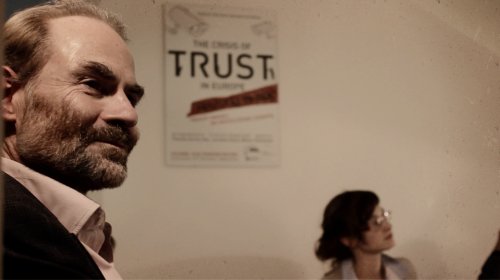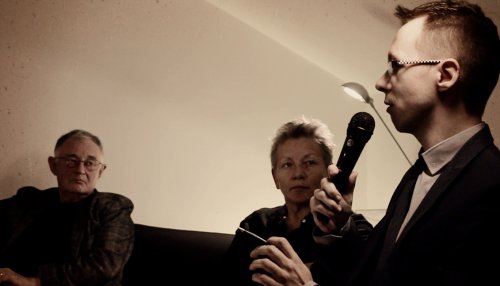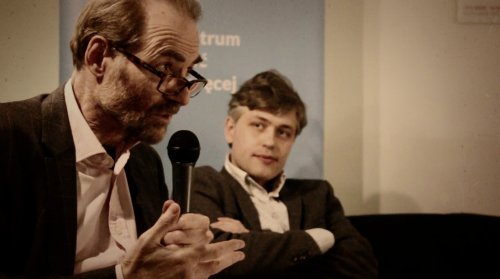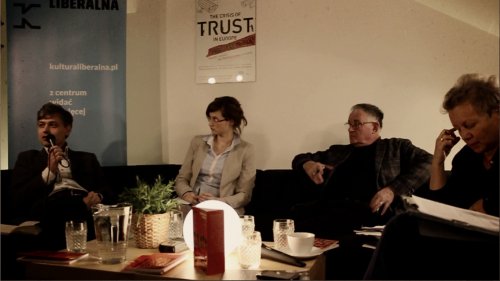Tomasz Sawczuk: My first question is directed to professor Timothy Garton Ash. You coordinated a team which recently published a report entitled ‘Freedom in Diversity,’ analysing the issue of migration, based on experiences of five countries – France, Great Britain, Germany, United States and Canada. One of the 10 ‘recommendations’ you propose is the notion that an immigrant should be able to become a citizen of a new country, if he or she stays in the country long enough. Many Europeans fear that such a policy will result in the blurring of the idea of ‘citizenship’ and the fading away of strong na- tional identity in their countries. Are these fears justified?
Timothy Garton Ash: Before I answer this question, I must stress that I am talking about Western Europe, which is a completely different situation from that of the countries of Eastern Europe. Eastern Europe was a multi-cultural, multi-ethnic, multi-religious territory, which became more homogenous because of Hitler, Stalin, their purges and divisions. Poland is a classic example of that. Ernest Gellner said that the countries of this region used to be like Oscar Kokoschka’s paintings, and over the course of history, have become more like the ordered canvases of Piet Mondrian.
Wiktor Osiatyński: Kokoschka doesn’t fit into Eastern Europe. It’s more like Kandinsky and his paintings of multicoloured circles next to one another. Indeed, Central European countries were multicultural, but these people lived next to each other, and not together. Apart from a very tiny group of elites, which mixed at universities, Jews or Russians did not mix with the rest of Polish society. This was not a community.
Timothy Garton Ash: Which does not change the fact that Western Europe faces a completely opposite process. The United Kingdom used to be a homogenous country as recently as 60 years ago, and became, rapidly, a multicultural, multiethnic society because of migration. We are observing similar cases in France or in Germany. Perhaps Poland will face a similar challenge, but for the time being this is a specific, Western European problem.
I think that offering citizenships should be one of the me- thods to lower the tensions caused by immigration. As far back as 10 years ago, about 10% of the permanent residents of Germany were described as Ausländer, foreigners. They didn’t have citi- zenship and weren’t eligible to apply for one. In my opinion, this is not only breaking a liberal rule, i.e. infringement of liberties and human rights, but also a factor that makes integration very difficult, not only for Germany. What is important, if we accept the rule that majority of residents should have citizenship, we should also accept double citizenships. We cannot force someone to resign from his or her present citizenship, so that he or she could become a citizen of our country.
Tomasz Sawczuk: But can you be loyal to both countries, if you have a double citizenship? Dubious loyalty to the new homeland might be a source of a justified reluctance to fo- reigners. Alain Finkielkraut expressed similar concerns in his interview for ‘Kultura Liberalna’.
Timothy Garton Ash: In my opinion, the question of how to be- have towards an alien is a question wrongly put – the point is that they should not be alien any more, isn’t it? Let’s take the example of Canada. There was a terrorist attack in their parliament very recently. But the terrorist was not a person with a double citi- zenship. He was not an immigrant, but a native Canadian, who converted to Islam. Our research shows that the integration of migrants is most successful in Canada, and not by an accident. The percentage of foreigners with a citizenship of the new co- untry is the highest there as well.
Jarosław Kuisz: I agree that, when we talk about immigration, we cannot forget about different experiences of countries from the two sides of the Iron Curtain. If we stick to the painting metaphors, then following the media coverage from Western Europe, the European imagination is dominated by some action painting in Jackson Pollock’s manner, uncertain about what the future will bring. On the other hand, especially if we look closely at Polish data, we have something like a ‘black square on black background’ – that is, total ignorance. We recently published in ‘Kultura Liberalna’ an interview with the director of the Polish Office for Foreigners, who said explicitly: only 1% of the Polish population are foreigners. 1 per cent! When compared with Western Europe, this is something extraordinary.
Tomasz Sawczuk: Why is this so important?
Jarosław Kuisz: Because the problem of immigration is a com- pletely abstract question for the vast majority of people in our country. Poles learn about foreignness from the stories of their relatives, who went to the West looking for a better life. Many important books, like Paul Scheffer’s Immigrant Nations with its analysis of the crisis of multiculturalism policy, are published in Polish. However, these translations are a continuation of the process of understanding the West, rather than a starting point for assessing our own situation. Poles discover the ‘alien’ in a less pleasant way, when they are treated as aliens themselves, unwel- come immigrants in Great Britain or in Germany. An unpleasant gesture or a sentence in a minor, everyday situation is enough. It could be the recognizing of oneself in an unpleasant role in a politician’s speech. And this all functions despite the fact that‘freedom of movement of people’ remains one of the pillars of a united Europe.
Monika Płatek: I also think that we shouldn’t compare the situation of Western countries to the Polish case. Saying that fo- reigners constitute only 1% of the Polish population is like saying that there are no abortions performed in our country.
I understand the category of ‘foreignness’ in much broader terms, and I think that Poland is not as homogenous a country as we like to think. An ‘alien’ does not have to be someone who hasn’t got citizenship, but could also be someone who doesn’t enjoy all the rights he or she should have. For instance, I think that women of reproductive age are alien in this sense in Poland. We don’t take them into account, we don’t think about their needs.
Emilia Kaczmarek: But how do we change this situation?
Monika Płatek: My suggestions come from the thoughts of two famous social psychologists. The first is Sam Harris, who claims that when we change the culture in which we are living, the way our brain functions changes as well, and hence the way we think changes. Example? A homophobe Pole who moves to Norway is a completely different man after few months, he has homosexual friends and doesn’t remember that he used to be a homophobe. A Norwegian transferred to our society will not make a difference as an individual, but can influence our homophobia through his or her example. Nevertheless, we shouldn’t expect any dramatic changes.
The other social psychologist is Jonathan Haidt, whose book ‘The Righteous Mind’ has recently been published in Polish. Based on research material gathered from 30,000 people from all over the world, Haidt proved that conservative, right-wing societies are more concerned with issues like God, homeland and respect for the government, while liberal societies are much more sensitive to other people, to the question of social justice. Poland is a right wing, rather than a liberal country. We have to remember theseperspectives whenever we discuss the situation of immigrants.
Emilia Kaczmarek: If we look closely at the countries of our region, Ukraine, Latvia or the Balkans, we can see that multi- national societies had to, or have to, deal with really serious crises. Therefore, can we say that the ethnic homogeneity of Poland, which was caused by some historical events, is a blessing in a way? That multiculturalism is a utopia?
Wiktor Osiatyński: A man can trust another man only when he lives in a society which has institutions, which can protect him in case that trust is lost. We don’t have such institutions in Poland, we can’t access them, or we simply don’t know that they exist. It’s no surprise then that a distrustful Pole has much more trust in society when he moves to the UK, where such institutions are much stronger. This is a question of institutions and the creation of an institutional culture, not only through citizenship. Citizenship is in fact a liberal phenomenon, and problems we have with minorities and trust to some extent result from the bankruptcy of liberalism, from the fact that we neglected the building of a sense of social community after 1989 in this part of the world.
Professor Monika Płatek said once that she listened to the ultra-catholic Radio Maryja for few weeks. And that Radio Maryja, filled with hatred and hostility from 5 to 8 pm, concentrates on building a sense of community and bonds between people from 7 am to 5 pm. Liberals failed in doing this in the early 1990s, giving up their place to the Right. And now we have problems with identity, as identity is not built through a liberal constitution, but through local communities or social institutions.
Emilia Kaczmarek: But how should we build such a commu- nity, which wouldn’t be based on hatred?
Wiktor Osiatyński: And how did the Germans and the French manage to overcome 700-year-old hatred between the two na- tions over the course of two decades? In the 1960s and 1970s, every French child spent at least half a year in a German house, and a German child in a French house. If someone thinks that Germans are horrifying, for him they are horrifying in general. But if he has a German child in his house and this child is in no way different than his own children, it turns out that the gene- ralized hatred was completely unjustified.
The other example is much more important, because it concerns the role of civic society in overcoming hatred between Hindu and Muslims in India. In places where the number of civicsociety organizations is high, but where there are separate Hindu and Muslim organizations, there was increased hatred between groups. However, when such organizations are formed not around religious issues, but to deal with problems like garbage disposal or the protection of children travelling to school, then the result is not only decreased hatred, but even the development of some form of friendship. Thus, we have to build social institutions from below, even if informally, making people cooperate to solve problems in order to make their lives better, even if they were unfriendly to one another before.
Tomasz Sawczuk: Would you like to defend liberalism against Professor Osiatyński, Professor Ash?
Timothy Garton Ash: In the report ‘Freedom in Diversity’, which you referred to in your first question, we argue that the discussion shouldn’t start with the idea of ‘multiculturalism’, as we will end up with misunderstanding and confusion. What is the question then? The question of a liberal should concern the best way to protect freedom. ‘Freedom in diversity’ means ‘wolność w różnorodności’, but I am not really sure if it keeps the meaning of the words in English. ‘Diversity’ means different customs, different views, different values, not only ‘różnorodność.’ These values should go hand in hand. For what does it mean, ‘to be free’? It means to have a free choice, an option to choose an alternative. The more alternatives we have, the more freedom we should have. How do we create a situation in which freedom and diversity complement each other as much as possible? One of the answers is education. In France, for instance, education is a classic institution, which facilitates integration. One cannot interfere directly in family life, but it is absolutely possible in school life. I am a supporter of a republican model of schooling, like in the US or in France.
Tomasz Sawczuk: So what’s the difference between your approach and multiculturalism?
Timothy Garton Ash: I don’t demand that all people love all cultures in the same way, as multiculturalists recommend. Our goal should be, rather, a civilized coexistence, tolerance, a classic liberal value. We should not expect too much from everyone – sympathy and respect for every culture – we should rather expect respect for the law and tolerance.
Tomasz Sawczuk: But would such tolerance be really enough? In the last year Poland issued 250,000 permanent residence permits, and more than 700,000 visas for Ukrainian citizens only. Should Polish politicians propose some other, more active approach to these people, apart from tolerance? And if yes, what kind of approach should it be?
Jarosław Kuisz: A call for tolerance might not be enough. Today, there seem to be two major options for long-term migration policy in the West. The first one emphasizes the supreme position of a host country towards the guest. The newcomer should adapt to the culture of the new country, learn its language and customs, and only then use the benefits offered by the new society. This is the view represented by Alain Finkielkraut, and such opinions are quite popular. This is a model to which Poland is heading, but more through negligence than through a conscious policy.
The other model recommends mutual accommodation, in which there is no single petrified culture or a permanent iden- tity of the host country. Every community has an identity that is changing historically. What is the conclusion? We, the hosts, should adapt to the newcomer, and at the same time, the new- comer should adapt to us. This is a dynamic concept, there isn’t any permanent point of reference, only the constant negotiation based on the respect to other human beings. Naturally, this is very difficult. How do we convince people to make that effort? The liberal philosopher Martha Nussbaum suggests, for instance, that we shouldn’t give up on various public ceremonies, which cultivate feelings of belonging to a national or local community. In this way, we can promote values that are close to liberalism, especially tolerance. In short, maybe instead of calling for tole- rance, we should facilitate and encourage encounters between people from different cultures.
Tomasz Sawczuk: But could this idea be realized on a European scale?
Jarosław Kuisz: If we’re thinking about how to build a real European community, it’s actually worth looking at the French- German experience that Professor Osiatyński mentioned. The German sociologist Ulrich Beck proposed – and this is a bit crazy, but a very intriguing idea – that we should adapt the idea of them ‘Erasmus’ exchange program on a higher level, so that it would include as many people of different ages and social backgrounds as possible. Why? To get to know other cultures at an intimate level, and to build a ‘European’ identity through biographies of specific persons.
Monika Płatek: Erasmus, which is sometimes called a ‘nice orgasmus’, has given us more than one million kids. But talking seriously, students coming back from Erasmus are completely different people. This experience provides them with tools for independent thinking. We must learn to be less introverted and inward looking, and embrace greater exposure to other cultures and societies. Otherwise, a catastrophe is right around the corner.
If people from abroad come to us, even if it is a ‘near abroad’, like Ukraine, we should pursue a policy of funding scholarships and education. We should educate these people, despite the fact that only some of them will stay with us, and some will move on.
Jarosław Kuisz: After 25 years of freedom, we have reached a turning point. There are no doubts about that. Closing our eyes won’t give us anything. For the first time we have to open ourselves to the Other, acknowledge people different from us, even within our own national borders. We have to face challenges related to some well-known minorities, like the Silesians, but we also have to realize that migration from the East might be a challenge. And this is a question for the younger generation. What kind of migration policy should we press for? If we decide on a French model that Alain Finkielkraut wrote about, a cata- strophe is guaranteed. The Polish media cover only a fraction of the social upheavals in French suburbia, we hear only about the biggest riots.
The other model of an open immigration policy – the model of mutual accommodation – is much more difficult. It requires new institutions, an unconventional model of education, but most importantly, the reconsidering of what constitutes Polish identity and culture in a globalized world. Hollow words about Jagiellonian Poland or the Confederacy of Warsaw from 1573 are not enough. For today’s Poles, shaped by the legacies of Communist times and by the early years of the Third Republic, this has no meaning at all for everyday life. Therefore, the most important question about migration policy is about our readiness to invest in the model of mutual accommodation, even if many countries of Western Europe haven’t done so. We have to think beforehand about that. Riots in many European capitals should be a serious warning.
Wiktor Osiatyński: All these problems were present at the Versailles Peace Conference after the First World War, when the two competing approaches towards national minorities first clashed. The United States forced their own model upon Europe, hoping that assimilation would follow, if human rights and the rights of minorities were guaranteed in constitutions. Supporters of a different solution, including Józef Piłsudski, knew that there is no chance for assimilation in agrarian societies, so they opted for a broad autonomy for different groups. The two most impor- tant words for coexistence of different people are ‘autonomy’ and ‘pluralism’. Not multiculturalism, not assimilation, but pluralism. Minorities should govern themselves with their own rules, they should create their own culture wherever possible, but we have to treat these cultures equally. This is the only solution. Piłsudski opted for that, and unfortunately lost. We know that the Versailles model which was imposed upon Europe did not pass the exam. Timothy Garton Ash: But why were some countries, like Canada, successful? Because from the very beginning they pursued a plan- ned migration policy based on… liberal culture. What is liberal culture? It is a civilized coexistence, a peaceful conflict, which gives birth to something good.








